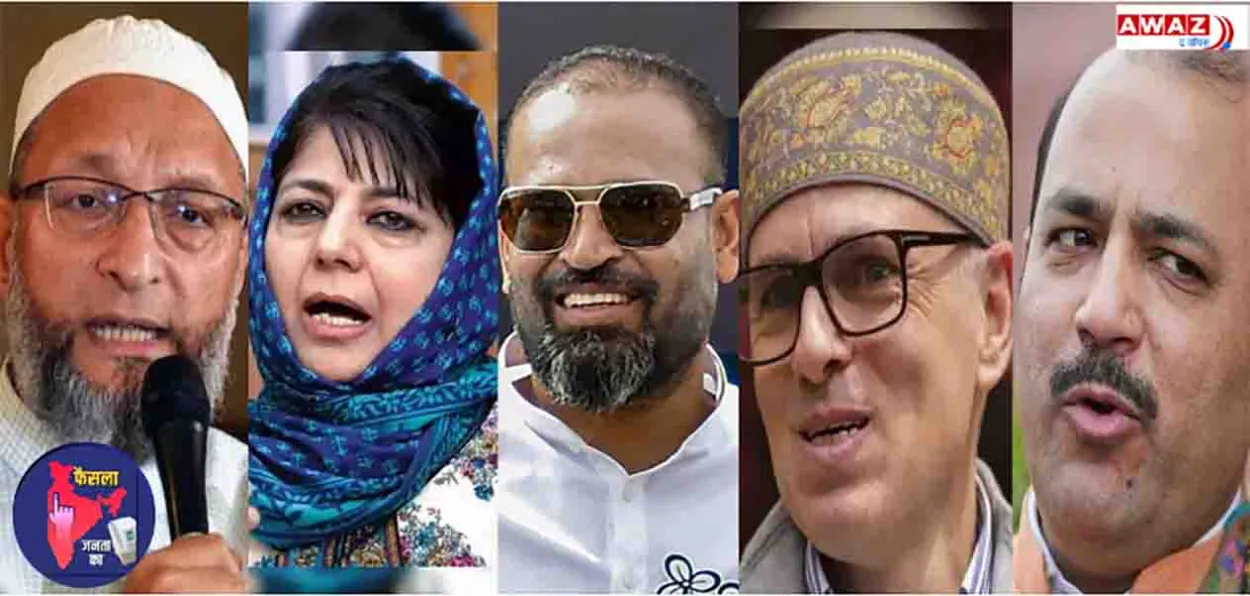
Mansooruddin Faridi/New Delhi
As the counting of votes for the Lok Sabha elections gains pace, one is reminded of the undercurrents in the Muslim community about the falling number of candidates from the minority community whom the parties gave tickets.
The ignoring of Muslims in giving tickets to candidates to contest by almost all political parties has not gone down well with the community. Forget about BJP, even parties like Congress, Samajwadi Party, and Trinamool Congress, have ignored Muslims due to the changing face of Indian politics.
In the recent Lok Sabha elections, the BJP has fielded only one Muslim candidate, while its ally JD(U) has fielded another candidate in Bihar. Due to this trend, the community's representation has also declined in the main opposition parties. Congress, Trinamool Congress, Samajwadi Party, RJD, NCP, and CPI(M) have fielded 78 Muslim candidates together, down from 115 in 2019.
In the last Lok Sabha elections, 26 Muslim candidates were elected to the Lok Sabha. Of these, four each from Congress and TMC, three each from BSP and SP, and one each from NCP and CPI(M). Others belonged to AIUDF of Assam, Lok Jan Shakti Paswan (now divided into two factions), IUML, and the Jammu and Kashmir National Conference.
In the mid-1980s, Muslims constituted 11 percent of India's population and held 9 percent of the seats in parliament. Today, they constitute 14 percent of the population and less than 5 percent of seats in parliament.
Political representation of Muslims at the state level is slightly better. There are more than 4,000 legislators in state Assemblies in India's 28 states, and about 6 percent of these seats are held by Muslim legislators.
In 1989, about 5 percent of the legislators of the major political parties in the lower house of the Indian Parliament were Muslims.
In the current Parliament, there are just above one percent of non-Muslims in a party's house.
BSP has fielded 35 Muslim candidates in 2024, the most among all parties. More than half (17) of these are in Uttar Pradesh, all but four in Madhya Pradesh, three in Bihar and Delhi, two in Uttarakhand, and one each in Rajasthan, Tamil Nadu, West Bengal, Jharkhand, Telangana and Gujarat.
By allocating 25 percent of the total seats for minorities in the 2024 Lok Sabha elections in Uttar Pradesh, the Bahujan Samaj Party has placed its bets on a Dalit-Muslim alliance for its revival in the state, which would send the largest number of MPs. Is. Parliament
The Congress is next with 19 Muslim candidates in the ongoing parliamentary elections, with six being the highest in Bengal.
The TrinmoolCongress stands third in the list with six Muslim candidates.
According to the 2011 census, 27% of the population of West Bengal are Muslims. They mostly live in North Bengal districts of Uttar Dinajpur (49.9 percent) and Malda (51.3 percent), Central Bengal district of Murshidabad (66.3 percent) and South Bengal districts of Birbhum (37 percent), South 24- are Parganas (35.6 percent), Nadia (26.8 percent) and North 24-Parganas (25.8 percent).
Though Samajwadi Party is accused of favouring Muslims, the UP-based party has fielded only four Muslim candidates in Lok Sabha elections where the community has a substantial population.
Instead, the party is now focusing on wooing OBCs, who make up 40 percent of the population in UP, along with Dalits who make up 20 percent.
Muslims keenly await the results of the elections as it would give them a fair idea of where the community stands in the political spectrum.
ALSO READ: Norway Chess: R Praggnanandhaa defeats world champion Ding Liren
With the decreasing number of Muslim candidates, the number of MPs will also decrease, but it will not be appropriate to target any party because till the other day even the parties that used Muslims as a vote bank have chosen to ignore the community.
